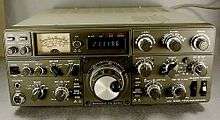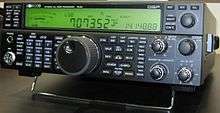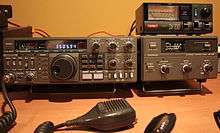Kenwood Corporation
|
| |
| Subsidiary | |
| Industry | Consumer electronics, electronics |
| Founded | 1946 |
| Headquarters | Hachiōji, Tokyo, Japan |
Key people | Shoichiro Eguchi, CEO 29 Jan 2003 |
| Products | Consumers electronics |
| Revenue |
|
|
| |
|
| |
Number of employees | 4,424 (2006) |
| Parent | JVC Kenwood Holdings |
| Website | http://www.kenwood.com/ |
Kenwood Corporation (株式会社ケンウッド Kabushiki-Gaisha Ken'uddo) is a Japanese company that designs, develops and markets a range of car audio, hi-fi home and personal audio, professional two-way radio communications solutions and amateur radio ("ham") equipment.
History
Established in 1946 as the Kasuga Radio Co. Ltd. in Komagane City, Nagano Prefecture, Japan, in 1960 the company was renamed Trio Corporation. In 1963 the first overseas office was founded in Los Angeles, California, USA.[2]
In the early 1960s, Trio's products were rebranded by the Lafayette Radio Company, with a focus on citizens' band radio.
An importer of Japanese-made electronics RadioShack was A&A Trading Co., and a bilingual Japanese-speaking manager from there, William "Bill" Kasuga partnered with George Aratani and Yoichi Nakase to establish a company that would be the exclusive importer of Trio products.[3]
The name Kenwood was invented by Kasuga as being the combination of "Ken", a name common to Japan and America that had been tested and proven acceptable to American consumers in the name of Kenmore appliances, and "Wood", referring to the durable substance as well as suggesting a relation to Hollywood, California.[3] The brand recognition of Kenwood eventually surpassed that of Trio's, and in 1986 Trio bought Kenwood and renamed itself Kenwood. George Aratani was the first chairman of Kenwood USA Corporation and succeeded by Kasuga.[2] Kenwood merged with JVC in 2008 as JVC Kenwood.

Kenwood introduced its Sovereign line of components in 2001.
Products
Amateur radio transceivers
Kenwood has offered lines of HF, VHF/UHF, and portable amateur radio models, including some with built-in digital data modes (Automatic Packet Reporting System, built on AX.25 packet radio) and modems needed to send and receive these protocols.
Among the product lines are the "TS" series of HF transceivers which cover the HF ("high frequency") bands, from 1.8 to 30 MHz.



Other series include the 100, 500, and the 2000 series. Kenwood also offers a "B" model, which is a transceiver without display or controls and is completely controlled by a remote computer or a separate control unit.
- Radios with built-in digital data modes and modems (for APRS)
KA Series hi-fi systems
Kenwood's series of "Integrated Amplifier" stereo power amplifiers, launched in 1977 and produced through the mid-1980s. The design for most of these items features a true dual-mono path for stereo output (in other words, no electrical components are shared between left- and right-channel amplification). Front plates were typically made in brushed aluminum with aluminum knobs and switches, glass covers, and in some cases analog VU meters.
Amplifiers in this series included (in no particular order)[4]
- KA-1000 (11/1980)
- KA-2000
- KA-2002 (09/1970)
- KA-2200 (10/1982)
- KA-7002 (1971)
- KA-7100 (10/1976)
- KA-7300 (10/1975)
- KA-8100 / KA-8150 (06/1977)
- KA-900 (11/1980)
- KA-907 / KA-9900 (10/1978)
- KA-9100 / KA-9150 (1977)
- KA-6100 / (1978/9)[5]
NV Series hi-fi systems
These were a series of mini hi-fi systems launched in 2000, all featuring an ultra modern design. Each one is dealt with separately.
- NV-301/701
The NV-301 and NV-701 were probably the top-of-the-range models of the NV series. Both shared a three-layered half-mirrored sleek design, the main difference mainly lay in the specification of the two systems. The NV-301 was the basic model with two speakers and with a simple phono input (marked for MiniDisc and DVD players) while the NV-701 was a 5.1 Dolby surround sound model with A/V inputs. Both featured a three-disc carousel, a cassette player with Dolby B noise reduction, a natural display, intelligent features and the ability to save up to 40 radio stations. Kenwood had clearly taken huge advantage of microcomputers as evident in the functions that are featured; had old methods been used, the NV-301/701 would have been much larger. These features had never been matched by other manufacturers, with other designs being rather crude by comparison.[6]
Communications equipment
- 1946: Kasuga Radio Co., Ltd. established (predecessor of Kenwood Corporation) in Komagane, Nagano prefecture.
- 1949: High-frequency transformer passes the NHK (Japan Broadcasting Corporation) approval certificate for the first time in Japan.
- 1955: Establishes the Tokyo and begins mass production of audio, communications and measuring equipment.
- 1958: Company’s first amateur radio goes on sale.
- 1960: Renamed Trio Electronics, Inc.
- 1962: Launches the industry’s first transistor amplifier.
- 1963: Sets up in the U.S., and begins full-scale overseas operations.
- 1966: Introduces fully transistorised audio products for the first time in the industry.
- 1969: The Trio TR-7100, 144MHz amateur radio car transceiver goes on sale.
- 1978: Introduces its first professional analogue two-way radios.
- 1979: Establishes the company’s first overseas production unit in Singapore.
- 1983: Enters the U.S. land mobile radio market
- 1986: Renamed Kenwood Corporation.
- 1991: Enters the European licensed PMR (Private Mobile Radio) market.
Begins selling license-free transceivers.
Signs an official supply contract with McLaren to provide wireless radio equipment for the F1 championship. - 1995: The Mir space station carries Kenwood’s amateur wireless equipment and verifies its reliability.
TK-250 launched — Kenwood’s first purpose designed PMR range for Europe. - 1996: Changes the subsidiary name from Trio-Kenwood to Kenwood, coinciding with the Company’s 50th anniversary.
- 1997: Becomes Japan’s first manufacturer to launch car-mounted DAB receivers.
- 1999: Jointly develops the world’s first mobile digital broadcast receiving system.
Introduces Pro-Talk PMR446 license free two-way radio. - 2001: Releases its first digital transceiver operating on P25.
- 2002: Develops a network interface module (NIM) for digital broadcasts via a communications satellite (CS).
- 2005: Forms a technical and capital alliance with Icom to jointly research the standardisation of technical specifications for digital wireless radio equipment(NXDN).
Kenwood Nagano Corp. acquires certification to “ISO/TS 16949”, the international standard for quality management specific to the automotive industry. - 2007: Kenwood announces 144/430 (440) MHz FM Dual bander TM-V71 series.
Announcement of completion of acquisition of the U.S. systems-based communication company Zetron, Inc.
Invested ¥20.0 billion and formed a strategic business alliance with Victor Company of Japan, Limited. - 2008: Notice of establishment of JVC Kenwood Holdings Inc.
Global launch of NEXEDGE® (NXDN)digital two-way radio system.
First NEXEDGE® digital trunked two-way radio system commissioned. - 2010: Introduces its first ATEX certified analogue two-way radio.
Kenwood wins the 2010 FCS Gerald David OBE Innovation in Business Radio Award for NEXEDGE® - 2011: Introduces NEXEDGE® OTAP (Over The Air Programming)
At the same time, JVC KENWOOD Holdings, Inc. changed its name to JVCKENWOOD Corporation.JVCKENWOOD Corporation completed an absorption of its three subsidiaries, Victor Company of Japan, Limited, Kenwood Corporation, and J&K Car Electronics Corporation. - 2012: Introduces KSDP (Kenwood Solutions Developer Programme) to serve customers and markets with radio communications solutions which precisely meet their needs.
- 2013: Kenwood announces launch of the ground-breaking TS-990S amateur radio base station.
Global launch of NEXEDGE® ETSI certified dPMR digital two-way radios.
Kenwood announce over 700,000 NEXEDGE® devices in use around the world. - 2014: Acquires E.F. Johnson Technologies Inc.
Launches NEXEDGE® ATEX Certified digital hand-portable radios.
Launches ETSI certified DMR hand-portable radios and repeater.
Launches new series of ETSI certified digital and analogue PMR446 license-free hand-portable radios. - 2015: Launches NEXEDGE® multi-protocol NX-5000 Series combining FM Analogue, P25 and NXDN capabilities in one radio.
References
- ↑ Kenwood Corporation
- 1 2 Kenwood Corporation / Company History
- 1 2 "Entrepreneur Bill Kasuga Courage Helped Him Bring Music To The Public's Ears", by Patrick Seitz, Investor's Business Daily, 3/21/2011 (alternate link: )
- ↑ Kenwood KA-1000 on thevintageknob.org, retrieved 2013-11-26
- ↑ (50W RMS per Ch. I bought one in 1979 and still operate it)
- ↑ "Kenwood NV-301/701 design", Image Shack, 2013-07-15, retrieved 2013-07-15
External links
| Wikimedia Commons has media related to Kenwood Electronics. |
- www.kenwood.com — Kenwood Global
- www.kenwoodcommunications.co.uk —Kenwood Communications UK
- www.jvckenwood.com —JVCKENWOOD Corporation
- Kenwood Transceivers by date of manufacture